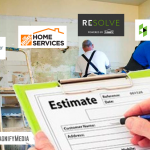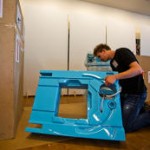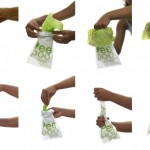Up & Go Is A Worker-Owned Alternative To On-Demand Home Cleaning Services
By Eillie Anzilotti , May 16, 2017
Rosario Jimenez is 28, and for the past three years she has been a worker-owner of EcoMundo Cleaning, a cooperative home-cleaning business based in northern Manhattan. Before she joined the coop, “I was in a dark period of my life,” Jimenez tells Fast Company through a translator. She had moved to New York from Mexico, and was trying to take care of her three children while struggling to find a job and living in a homeless shelter. Her friend saw a flier for EcoMundo and encouraged Jimenez to apply; she did, and became a member.
Now, Jimenez spends around 30 hours cleaning per week–anywhere from three to 10 homes anywhere in the five boroughs–and takes home around $700 at the end of it. It’s enough to keep her in an apartment and her kids in school, but she says that she’s always looking to take on more hours.

A new platform called Up & Go will help her do so. Up & Go, which launched this month, is web app through which users can book cleanings with worker-owners from EcoMundo, as well as two other New York City-based coops: Brightly Cleaning Cooperative, and Cooperative Cleaning of New York. In form, it’s not unlike Handy–a streamlined, tech-enabled way to schedule and pay for a cleaning. But in principle, it’s vastly different: Up & Go retains the cooperatives’ original pricing, which is negotiated and decided by the worker-owners, the majority of whom are women from disadvantaged backgrounds. (Fast Company covered Up & Go last year, when it was in the development stage and called Coopify.)
The purpose of Up & Go, says Steven Lee, a managing director of Robin Hood, New York’s largest poverty-fighting organization and one of the platform’s supporting agencies, is to bring these cooperative businesses into the 21st century and into competition with the tech companies like Handy and TaskRabbit that are transforming the residential cleaning industry.

“In a community around cooperative work, the way it’s typically done is by word-of-mouth referrals, by talking to others–what I call ‘phone-to-ear,’” Lee says. “So far, it hasn’t reached the ‘finger-to-screen’ audience–people who are used to more high-tech and mobile booking options.”
While coops like EcoMundo reach homes all across New York, the majority of their clientele is concentrated around the business’ headquarters in upper Manhattan, Jimenez says, where worker-owners can advertise the business at farmers’ markets with fliers–not unlike how Jimenez’s friend first heard about EcoMundo. For small businesses like the three coops that are now part of Up & Go, marketing has long been a sticking point, says Sylvia Morse, a project coordinator at the Center for Family Life (CFL) in Brooklyn, which has facilitated the development of several cooperative businesses in the city, and managed the process of bringing about Up & Go. “These coops were basically spending up to $1,000 to secure a single repeat customer through fliers, and relying on referrals to grow,” Morse says.
Robin Hood, meanwhile, has a history of funding coop development; that organization partnered with CFL to look into whether the tech-driven shifts in the gig economy could also support worker cooperatives. “Worker-owned businesses have a proven track record of providing a good living wage in a dignified setting–why shouldn’t the control the same technology that these larger competitors entering the home services space are using?” Morse says. Barclays came on board as funder and made an investment of $400,000 to develop the platform; CoLab Cooperative, a worker-owned digital agency, did the buildout.

Up & Go works much like a regular booking platform: It aggregates the schedules of workers across the three participating cooperatives, and users can either select to book from a particular coop, or all three. Because of the fair-wage ethos that accompanies the cooperative model, workers on Up & Go earn $4-5 more dollars per hour than other cleaning-industry workers in the area; Up & Go jobs yield around $22.25 per hour, as opposed to the average price of $17.27 in the region.
So while the platform’s services are more expensive, its organizers and the cooperative worker-owners are hoping the ethics will be a draw. As opposed to other home-services apps, which keep between 20% to 50% of the service price, Up & Go workers take home 95% of the cost; the remaining 5% is funneled back toward app maintenance, and the worker-owners remain in control of their scheduling preferences and their terms. While platforms like Handy are able to pay for subway-car-long advertisements, it doesn’t actually employ cleaners–it contracts out workers on a job-by-job basis, an arrangement that has resulted in little ethical oversight, short-changed compensation, and several lawsuits.
Though Up & Go is still relatively tiny–the three cooperatives represent around 30 members–its organizers see potential for it to scale up, both in New York and to cities across the country, and to reach other industries like dog-walking and childcare, where cooperative models are prevalent. Lee says he’s heard interest from coops in Oakland and Austin, but the first step will be establishing proof of concept with the small launch in New York City. “Once we get some traction, it is 100% likely that this concept will be able to take root among other cooperative communities,” he says.
The new web app is giving worker-owned cleaning cooperatives a much-needed tech boost to expand their reach–and hopefully paving the way for a more tech-savvy approach to winning new customers for more equitable businesses.
Rosario Jimenez is 28, and for the past three years she has been a worker-owner of EcoMundo Cleaning, a cooperative home-cleaning business based in northern Manhattan. Before she joined the coop, “I was in a dark period of my life,” Jimenez tells Fast Company through a translator. She had moved to New York from Mexico, and was trying to take care of her three children while struggling to find a job and living in a homeless shelter. Her friend saw a flier for EcoMundo and encouraged Jimenez to apply; she did, and became a member.
Fast Company , Read Full Story
(48)














